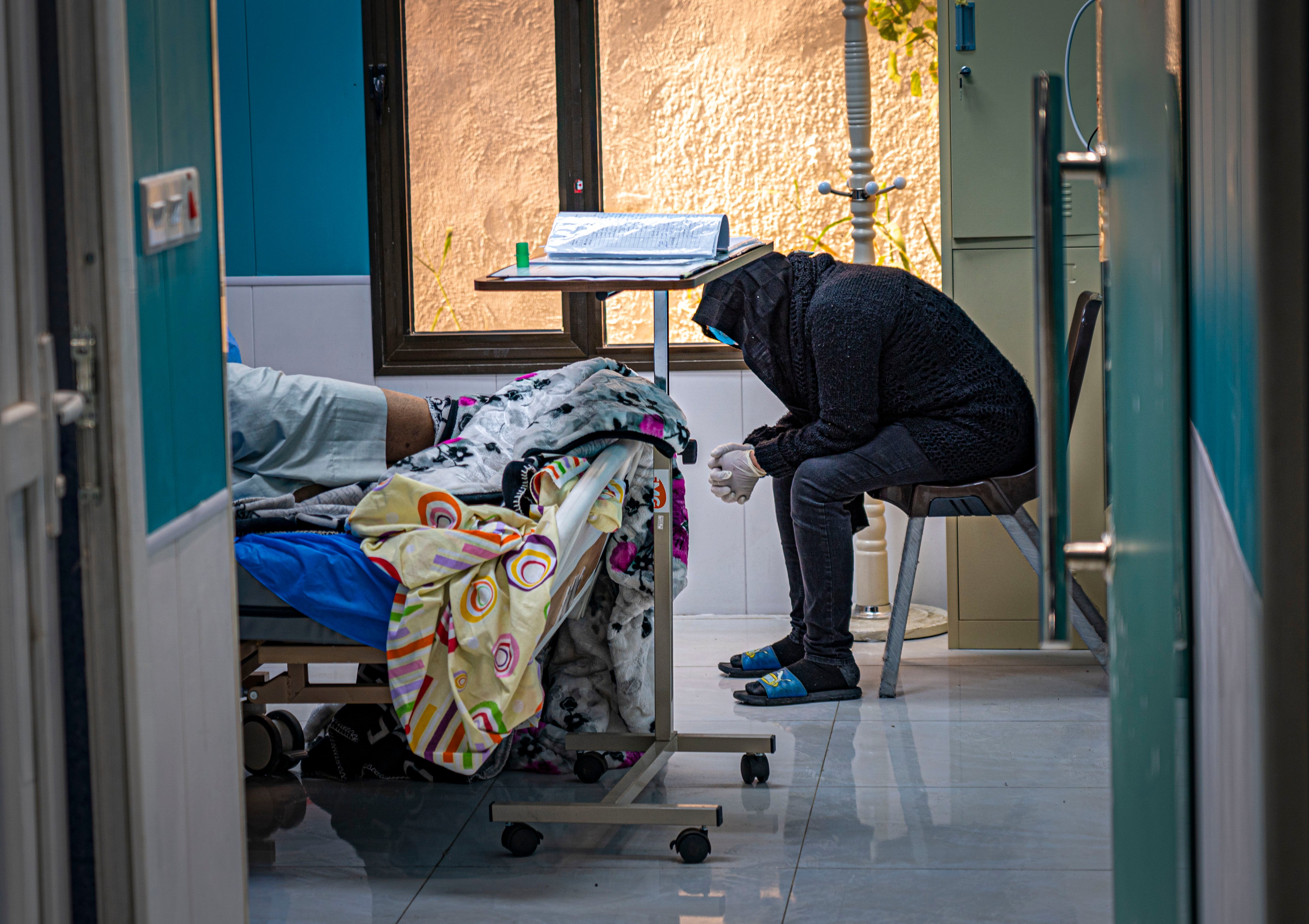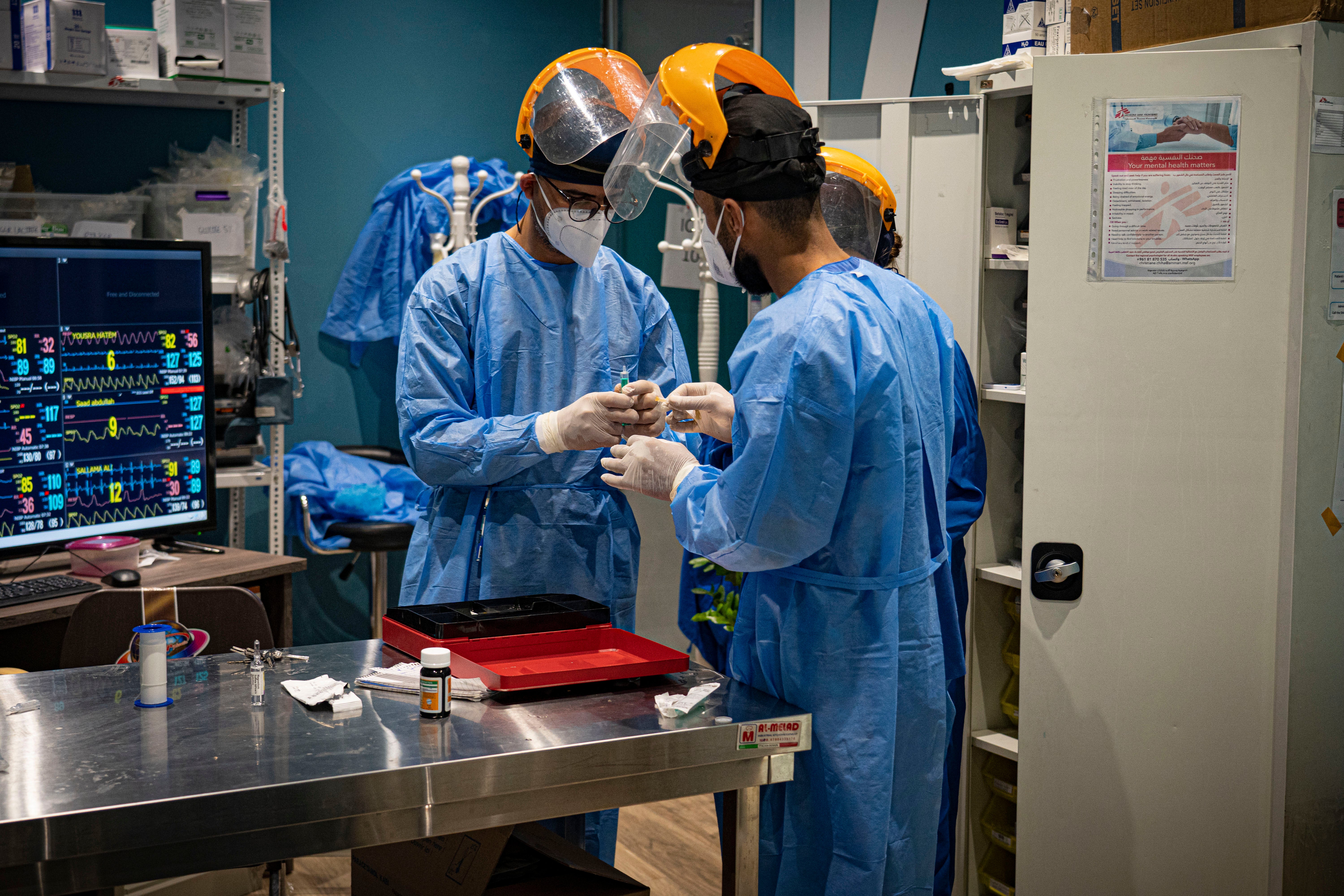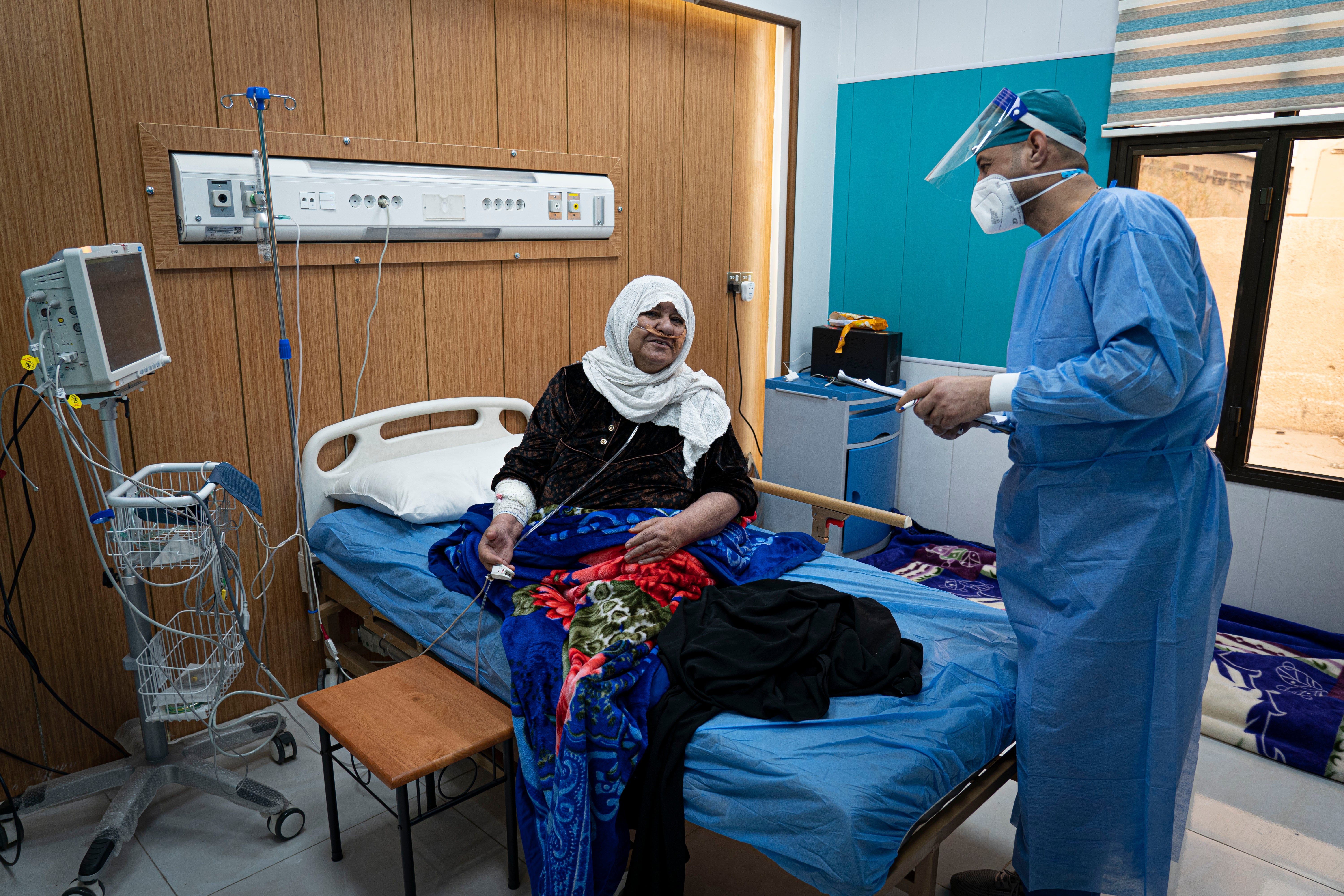Iraq’s deadliest coronavirus wave is only just beginning
Countries around the world feel like the end of the pandemic is finally in sight. But in Baghdad, doctors tell Bel Trew that, for them, the worst is yet to come


Your support helps us to tell the story
From reproductive rights to climate change to Big Tech, The Independent is on the ground when the story is developing. Whether it's investigating the financials of Elon Musk's pro-Trump PAC or producing our latest documentary, 'The A Word', which shines a light on the American women fighting for reproductive rights, we know how important it is to parse out the facts from the messaging.
At such a critical moment in US history, we need reporters on the ground. Your donation allows us to keep sending journalists to speak to both sides of the story.
The Independent is trusted by Americans across the entire political spectrum. And unlike many other quality news outlets, we choose not to lock Americans out of our reporting and analysis with paywalls. We believe quality journalism should be available to everyone, paid for by those who can afford it.
Your support makes all the difference.Praying feverishly under her breath, the wife of a critically ill Covid-19 patient paces the corridors of the Baghdad coronavirus ward against a sudden tide of doctors. Behind her on the hospital bed, her asthmatic husband starts to spasm painfully as his airways close. Exhausted medics rush to save his life. Against the insistent sigh of ventilators, with her head bowed, his wife pleads for a miracle.
It is another difficult afternoon for the Medecins Sans Frontieres (MSF) staff working at the al-Kindi hospital in the Iraqi capital which over the last few weeks has witnessed an unprecedented surge in Covid cases that threatens to overwhelm the healthcare system. Funded by our Supporter Programme, The Independent spoke to staff about their fears for the coming months.
“Today all 51 beds for serious and critical patients are full. There are people waiting in the emergency room for a bed to become free,“ Omar Ebeid, MSF’s project coordinator in Baghdad, says.
“We are receiving many seriously ill people and many are dying. With the highest ever number of cases in Iraq declared we expect this situation to continue for a while, and that is very worrying.”
In many countries across the world, people have been tentatively celebrating the light at the end of the tunnel after a year of the pandemic. Lockdowns are gradually lifting and vaccine programmes are in full swing.
In Iraq, however, the opposite is happening. The war-ravaged country is now in the grips of its worst wave of the deadly virus so far: on Wednesday last week the health ministry registered over 8,300 cases, its highest ever daily figure. Since then, the numbers have remained consistently high and, because of a woeful lack of testing, the true number of infections is expected to be far higher. Overall, official numbers show more than 940,000 have been infected with the virus while nearly 14,800 people have died.
After a dip in numbers over winter, Covid-19 appears to have returned with full force, raging through the 40 million-strong population, which has struggled to impose social distancing.
Iraq’s health ministry has warned of the “dire consequences” of citizens failing to heed coronavirus prevention measures, which it said were almost “non-existent in most regions of Iraq”. It called on tribal sheikhs, activists and influential figures to speak out and inform the public on the severity of the pandemic.
Just a few months ago the team at MSF – which runs a joint facility with the Iraqi ministry of health – thought the numbers had sunk so low they would wind down their clinic.
“We had started to consider when we could pull out. In the end, we had to cancel the exit, “ says Catherine Moody, head of MSF’s mission in Iraq. “These numbers are real. This is not a little bump, they are continually going up.”
Teams are now working around the clock to keep people alive and it has led to signs of burnout, says Dr Ali al-Keel, one of MSF’s Iraqi staff members.
“The second wave came really fast,” he says, wearing multiple layers of personal protective equipment as family members sleep on the floor of packed wards behind him. “It’s like running a marathon but the finish line keeps moving. “

One of the key problems is the lack of vaccines. While several countries have already successfully inoculated a significant proportion of their population, Iraq is trailing far behind. It received its first shipment of vaccines only last month – 336,000 AstraZeneca jabs from the World Health Organisation-supported Covax programme – with 50,000 Pfizer jabs following last Sunday.
Before that, the country had received just 50,000 doses as a donation from China to immunise healthcare workers.
So far the health ministry says more than 110,000 people have been vaccinated. The new doses would barely cover the 216,000 or so medical workers believed to be in Iraq.
Officials tell The Independent that, while they are preparing 80 field hospitals across the country and several thousand Covid-19 beds, they still worry it will not be enough. “We saw this surge in numbers coming months ago and we issued tens of statements warning people about what will happen if they do not follow the health rules,” health ministry spokesman Saif al-Badr says. “But there has been no thorough application of the measures.
“It’s related to health education, we set the rules but we are not responsible for enforcing them and people are not following them.”
The country has imposed several round-the-clock curfews that in some areas, such as central Baghdad, have been policed by heavily armed members of the security forces.
But in other cities, towns and villages – particularly those ravaged by recent wars like Mosul, the former Isis stronghold – few people wear masks while market places and streets are jammed.
Badr tells The Independent that they hoped the vaccine rollout would help, adding that they had so far negotiated the procurement of 6 million vaccines – but that was not enough to ensure herd immunity.
“We are even worried about another surge, even worse than now,” he continues.
He says there were particular concerns about 1.4 million people internally displaced within the country, many of whom live in makeshift tents where social distancing is impossible. Because of this, MSF staff argue that Iraq should be considered a global priority.

It is one of the hardest-hit nations on the planet: its health system has been weakened by years of conflict and its economy is struggling in the wake of the crash in the price of oil. All of which mean it is ill-equipped to halt the spread of the virus.
Back in the clinic, MSF workers say that, of the 414 admissions to their wards since the end of September, 156 have been in the last month alone. They are already at full capacity and fear this will be the case in hospitals across the country.
Ziyad Ismeel, an MSF medical assistant, says he is also concerned that in this second wave the patients are younger and they are arriving in a more critical state. Ebeid, meanwhile, describes the mortality rate as “frightening”.
Zohour Assaid, 55, one of MSF’s patients who is recovering after almost dying from the virus, says she has noticed cases soar in her community over the last month and urged the population to take care.
“Please take this seriously, wear your masks, stay home, it’s real it’s deadly,” she says, struggling to talk from her hospital bed. “I hope, God willing, Iraq will be safe.”

Join our commenting forum
Join thought-provoking conversations, follow other Independent readers and see their replies
Comments